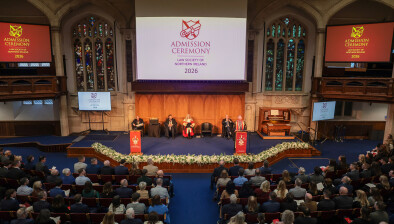High Court: Parties can continue to live together after decree of divorce

The High Court has granted a decree of divorce to a couple who will continue to live together in the family home under the terms of their settlement agreement.

About this case:
- Citation:[2023] IEHC 748
- Judgment:
- Court:High Court
- Judge:Mr Justice John Jordan
Delivering judgment for the High Court, Mr Justice John Jordan determined that “if a couple can be considered as living apart from one another while living in the same dwelling provided that they are not living together as a couple in an intimate and committed relationship… it is difficult to see any principled objection to a similar arrangement continuing by agreement after a decree of divorce is granted”.
Background
The parties married in 2004 and had two children. The parties commenced living separate lives in July 2017, whilst continuing to live together in the family home.
Family law proceedings were issued in July 2022 under the Family Law (Divorce) Act 1996 (as amended). As the applicant had been diagnosed with a serious illness and had a poor prognosis, she wished to bring the proceedings to a conclusion in order to put her affairs in order and to safeguard the future of the children, who were dependents of the marriage.
The parties reached a compromise of all the matters at issue between them and on 19 July 2023, they signed an agreement which recorded that compromise. On 6 October 2023, the parties sought unsuccessfully to have the terms of settlement ruled by the Circuit Court.
The applicant appealed to the High Court.
The High Court
Mr Justice Jordan stated at the outset that he was satisfied that the compromise made proper provision for the spouses and dependent children, that there was no reasonable prospect of reconciliation between the spouses and that, at the date of instituting the proceedings, the spouses had lived apart for a period amounting to at least two years within the past three years.
The court considered that there was nothing unusual about the settlement agreement, with the exception of a term which provided for the construction of a garden room in which the respondent could play his musical instruments, implying that the applicant and respondent would continue to live in the same house the divorce is granted.
Mr Justice Jordan confirmed that the proofs were satisfied as set out in s.5 of the 1996 Act and Article 41.3.2 of the Constitution, in that there was no reasonable prospect of reconciliation between the parties, that proper provision having regard to the circumstances would be made for the spouses and their dependents, and that all further conditions as prescribed by law would be complied with.
The court contemplated the nature and extent of the discretion afforded to the court by the inclusion of the word “may” in s.5 of the 1996 Act, which states that “the court may, in exercise of the jurisdiction conferred by Article 41.3.2 of the Constitution, grant a decree of divorce in respect of the marriage concerned”.
Noting that an “argument might be advanced that the word may in Article 41.3.2 and in s.5 of the Act ought to be construed as shall in the event that the Court is satisfied of the matters recited at s.5(1) (a), (b) and (c)”, Mr Justice Jordan considered that “it is difficult to envisage many circumstances in which a Court could refuse to grant a decree of divorce if the requirements of s.5(1)(a), (b) and (c) are satisfied. Put another way, would a Court be entitled, in such circumstances, to force two spouses to remain married.”
Nonetheless, the court declined to decide that issue on the basis that “it is possible that circumstances would arise in a case such that a Court would consider that it had an obligation to exercise its discretion and refuse to grant the decree of divorce sought even if the evidence did appear to satisfy the statutory requirements. It could perhaps happen that issues of lack of capacity might arise — or an intent to conspire to perpetrate a fraud on the Court or on the Revenue Commissioners.”
Proposing to make a decision on the basis that a discretion exists, the court evaluated whether or not any there was any good reason justifying the refusal of the decree of divorce.
Remarking that “one would expect a couple who divorce to live separate and apart after the Decree”, the court considered: “While section 15 (2)(a) of the Act refers to it not being possible for the spouses concerned to reside together where a decree of divorce is granted this is not to be interpreted as a prohibition. It is rather an articulation of what is the normal position following divorce and in the context of setting out necessary considerations for the Court when exercising its discretion in respect of miscellaneous ancillary orders - including those affecting the family home.”
The court continued, “if a couple can be considered as living apart from one another while living in the same dwelling provided that they are not living together as a couple in an intimate and committed relationship…it is difficult to see any principled objection to a similar arrangement continuing by agreement after a decree of divorce is granted.”
Noting that “the applicant and the respondent live their own lives — rarely talk — and effectively lead entirely separate lives although living and sleeping under the one roof”, Mr Justice Jordan opined: “There cannot be any doubt but that these living arrangements are difficult and stressful for the applicant and the respondent. Nor can there be any doubt but that these living arrangements are the result, in part at least, of the housing crisis and difficulties in either party securing suitable alternative accommodation at an affordable cost.”
Considering Courtney v Courtney [1923] 2 IR 31, the judge wondered “if the policy of the law allows spouses to be free to contract that they will not cohabit, how then could it be that former spouses… could not contract that they will cohabit (although in a non-marital arrangement)”.
Mr Justice Jordan also highlighted the analysis of the “living apart requirement” in MMcA v XMcA [2000] 1 IR 457, observing that “McCracken J. was satisfied that in the same way two people can live apart and still maintain a loving and committed relationship, two people could also live together without being in a marital relationship — it depends on the intentions of the parties”.
Reflecting on public policy concerns, the court considered it of relevance that “the impact of divorce and marital breakdown on children is at least significantly influenced by the level of conflict that exists between both parents before, during and following the breakdown of the parental relationship… public policy should encourage realistic negotiation and settlement with a view to reducing or avoiding the detrimental impact of the breakdown on the welfare of the children involved”.
Conclusion
Concluding that the settlement terms would afford “a solution that will minimize stress and upheaval in a family where the mother has a serious illness”, the court granted the decree of divorce sought and made ancillary orders in terms of the settlement agreement.
R v M [2023] IEHC 748











